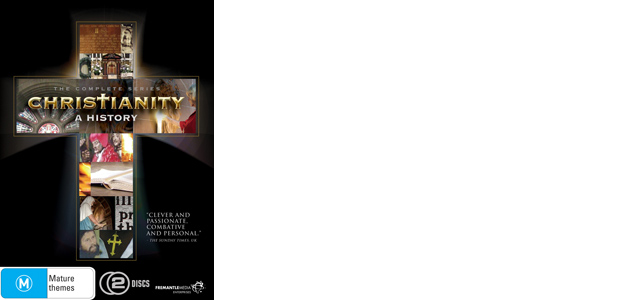(M) Freemantle Media DVD
In 2009 a documentary was filmed for Britain’s Channel 4 called Christianity: A History. Last year saw the ABC screen it and as one who is interested in the historic triumphs and regrets of my faith, I found it fascinating.
Christianity: A History consists of eight parts each led by an intriguing personality with some kind of vested interest in the topic being discussed.
Part One was called “Jesus the Jew” where Man Booker Prize-winning author Howard Jacobson looked at the places where the historical Jesus lived. Through walking the streets that Jesus did, I enjoyed the hands on approach of the documentarians.
In Part Two we are led by former British Defence Secretary Michael Portillo on a journey from Rome as a persecuting empire to a Christian empire. In Part Three, presented by theologian Dr. Robert Beckford, travels to around 400AD when the Roman Empire had collapsed and money, religion and writing almost disappeared off the face of the earth. It was during this time when Britain was ruled by pagans that the mystics of Celtic Christianity flourished and eventually sent missionaries to Britain. When paganism eventually adopted Christianity, instead of destroying it, the Pope decided to compromise with it. There is a beautiful message in the end of acceptance and how it was only from going through the Dark Ages did Britain form a Christian identity. A brilliant instalment.
Part Four is a heartbreaking analysis of the “Crusades”, in Part Five is called Ann Widdecombe explores the brilliance of Martin Luther’s original reformation. Part Six explores a little known part of history, the Christianisation of Africa. Part Seven explore science and the Christianity making an excellent case against the 16th Century church by picking obscure experts and his friends for his proof.
The final segment is called “The Future of Christianity” and was presented by QC and ex-First Lady Cherie Blair. She is a practising Roman Catholic, which was fantastic to see, and she drew the important point out that the European church is dying and it needs to adapt in order to be relevant. Her examples of churches that have done just that were one wonderful Evangelical faith community and a liberal congregation. This sums up the ongoing debate, but draws no conclusions on which way the church should go.
It is disappointing to see so many personal agendas making their way into this documentary. I am all for theological and philosophical debate, but it shouldn’t be disguised as “history”.
But there were some great presentations, most notably in parts three and six, but I would have loved to see practising Christians presenting all the parts instead of sprinkling a few amongst jaded ex-believers, atheists, and non-practising-Jews.
Callum Iles












